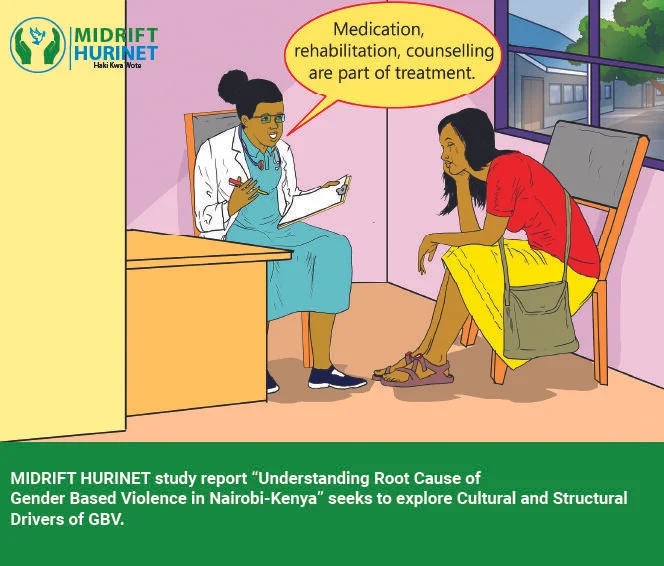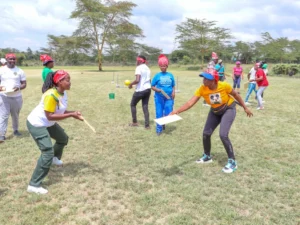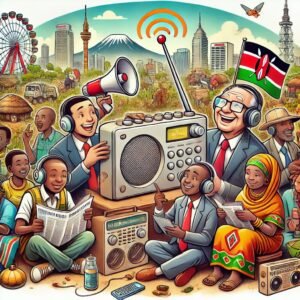
Gender-based violence (GBV) is often perceived as an issue predominantly affecting women and girls; however, men also experience GBV, though their experiences are frequently underreported and overlooked.
In Kenya, societal norms and stereotypes contribute to the silence surrounding male victims. Men who suffer intimate partner violence (IPV) often display immense courage in the face of potential disbelief or ridicule, which can deter them from seeking help. This lack of recognition exacerbates their trauma and hinders access to necessary support services, underscoring the need for a more empathetic and supportive environment.
The societal expectation for men to embody strength and resilience further complicates their willingness to report abuse.
Admitting victimization can be perceived as a sign of weakness, conflicting with traditional masculine ideals. This internal conflict often leads to unhelpful coping mechanisms, such as substance abuse, which can perpetuate cycles of violence and mental health challenges.
Addressing GBV requires the active involvement of men, not only as allies but also as advocates for change.
In Nairobi’s informal settlements, initiatives have emerged where male ‘agents of change’ educate their peers on preventing violence against women and girls.
By challenging entrenched attitudes and promoting gender equality, these men play a crucial role in transforming community norms and reducing GBV.
Empowering young men as champions in ending violence against women and girls has shown promise. Programs that engage adolescent boys and young men in discussions about gender equality and provide them with life skills contribute to positive behavioral changes. Such initiatives encourage young men to become advocates for women’s rights, fostering a more inclusive and safe society.
While GBV predominantly affects women and girls, it is imperative to acknowledge and address the experiences of male survivors. Simultaneously, engaging men as proactive participants in the fight against GBV can lead to more comprehensive and sustainable solutions. By challenging societal norms, providing support to all victims, and promoting gender equality, communities can work towards eradicating GBV in all its forms.
MIDRIFT HURINET’s study, “Understanding the Root Causes of Gender-Based Violence in Nairobi-Kenya,” underscores the pivotal role men play in both perpetuating and preventing gender-based violence (GBV).
The research highlights that entrenched patriarchal norms and traditional gender roles contribute significantly to the prevalence of GBV in Nairobi’s informal settlements. Men, often viewed as primary authority figures, may resort to violence to assert dominance or control, perpetuating a cycle of abuse.
However, the study also emphasizes the potential for men to act as catalysts for change. Engaging men in GBV prevention initiatives is crucial for challenging harmful masculinities and promoting gender equality. By involving men in educational programs that address the consequences of GBV and the importance of equitable relationships, communities can foster a culture where violence is unacceptable, instilling a sense of hope and optimism for the future.
Furthermore, the research identifies the need for support systems that encourage men to speak out against GBV and support survivors. Creating safe spaces for men to discuss gender issues and reflect on their roles can lead to a deeper understanding and commitment to ending violence. Such initiatives can dismantle the societal norms that condone GBV and pave the way for more harmonious community dynamics, highlighting the collective responsibility in addressing GBV.
MIDRIFT HURINET’s study illustrates that while men have historically been associated with the perpetuation of GBV due to societal constructs, they also hold the key to its eradication.
By transforming attitudes and behaviors and actively participating in prevention efforts, men can significantly contribute to reducing gender-based violence in Nairobi.
Gender-based violence (GBV) is often perceived through a lens that primarily focuses on male-on-female violence.
However, MIDRIFT HURINET’s study, “Understanding the Root Causes of Gender-Based Violence in Nairobi-Kenya,” sheds light on the nuanced and
often overlooked instances of GBV perpetrated by men against other men. This facet of GBV is deeply rooted in societal norms, power dynamics, and cultural perceptions prevalent within Nairobi’s informal settlements.
In these communities, traditional gender roles and expectations can foster environments where expressions of masculinity are rigidly defined. Deviations from these norms, such as exhibiting behaviors perceived as non-masculine or identifying as LGBTQ+, can make men targets of violence perpetrated by other men. This violence serves as a means to enforce conformity and assert dominance, perpetuating a cycle of oppression and fear.
The study highlights that such acts of violence are not merely interpersonal but are reinforced by broader structural and cultural factors. The stigma associated with non-conformity to traditional masculinity, lack of legal protections for marginalized groups, and inadequate support systems contribute to the perpetuation of male-on-male GBV.
Moreover, societal reluctance to acknowledge men as victims of GBV further silences these experiences, leaving survivors without recourse or support.
Addressing this issue requires a multifaceted approach. Community-based interventions that challenge harmful gender norms and promote inclusivity are essential. Educational programs aimed at redefining masculinity and fostering acceptance of diversity can mitigate the prejudices that lead to such violence. Strengthening legal frameworks to protect all individuals, regardless of gender identity or expression, is crucial in providing avenues for justice and support for survivors.
MIDRIFT HURINET’s study illuminates the complex dynamics of GBV perpetrated by men against men in Nairobi’s informal settlements. By acknowledging and addressing these often-hidden aspects of GBV, stakeholders can work towards creating a more inclusive and safe society for all individuals, irrespective of gender or sexual orientation
By
Jacob Karani




